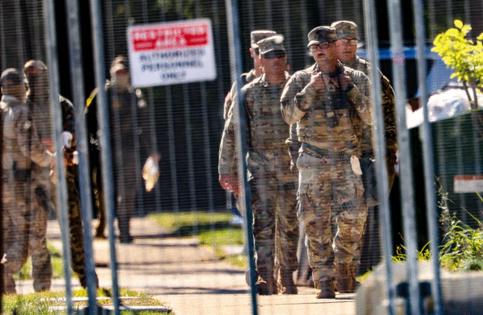No ruling imminent as Supreme Court asks for more briefing in Illinois National Guard deployment case
Published in News & Features
CHICAGO — The U.S. Supreme Court on Wednesday asked for more briefing in the ongoing fight over President Trump’s ability to deploy National Guard troops to Illinois, signaling that the court’s highly anticipated ruling is still weeks away.
U.S. District Judge April Perry issued a temporary restraining order Oct. 9 barring National Guard troop deployment in Illinois, and later extended it indefinitely pending a final ruling on the merits of the case.
Meanwhile, the Trump administration has asked the Supreme Court to stay Perry’s order, calling it part of a “disturbing and recurring pattern” that “improperly impinges on the President’s authority and needlessly endangers federal personnel and property.”
The Supreme Court has been expected to weigh in any day. However, on Wednesday the court asked both sides to submit new briefs dealing with whether the term “regular forces” means “the regular forces of the United States military,” and if so, how that fits into existing law involving the president’s authority to deploy troops.
The court gave both sides until Nov. 10 to submit the briefs, and invited other interested parties to submit “friend of the court” briefs as well. Reply briefs are due Nov. 17.
The order came just minutes after lawyers for the Trump administration notified the justices of the decision by the 9th U.S. Circuit Court of Appeals to rehear “en banc” a case over National Guard deployment in Portland, Oregon, meaning by a full slate of judges rather than a three-judge panel.
That decision reinstated an order — at least for now — by the district court in Oregon blocking Trump from deploying troops, and means the two circuits in Oregon and Illinois could eventually align on the issue.
In his Oct. 17 brief to the Supreme Court, the U.S. solicitor general asked that Trump be allowed to deploy some 700 troops in Illinois — 300 from the Illinois National Guard and another 400 federalized out of Texas earlier this month.
In a 46-page response, the state said it would be inappropriate for the high court to get involved at this stage in the proceedings, where a district court’s decision has yet to be decided on appeal.
The filing also said lawyers for Trump offered “no meaningful response” to the factual basis for Perry’s Oct. 9 temporary restraining order, adding that declarations submitted by a series of immigration officials outlining purported violence against agents and out-of-control protests simply did not hold water.
“In fact, applicants do not even attempt to rebut that much of the activity the declarants complained about was constitutionally protected,” the state response stated.
The Supreme Court fight is playing out on an unusually fast track, with Trump appealing just a day after the 7th U.S. Circuit Court of Appeals declined to grant a stay to Perry’s order, ruling her findings were not “clearly erroneous” and that “the facts do not justify” Trump’s actions in Illinois.
_____
©2025 Chicago Tribune. Visit at chicagotribune.com. Distributed by Tribune Content Agency, LLC.







Comments